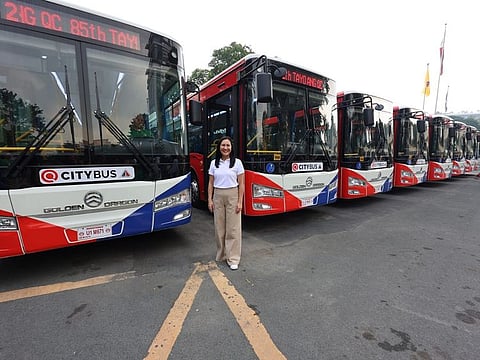Philippines: 2 cities lead electric vehicles drive
QC, Cebu rev up greener, fossil fuel-free transport

Manila: Two major Philippine cities are revving up the clean transport drive with electric vehicles and buses.
The local governments of Quezon City (QC) and Cebu City recently announced separate moves to cut carbon emissions while improving public transport service.
The QC government on Wednesday announced the rollout of e-buses as part of its pioneering urban transport programme.
Free service
The service is free to residents of QC.
QC Mayor Joy Belmonte said Wednesday that the project bolsters their commitment to pioneering environmentally sustainable practices.
“We are excited to roll out these electric buses as part of our city’s dedication to implement programs and policies that promote environmental sustainability,” she said in a statement.
QC (land area: 166.2 km2) is one of the 16 component cities of the National Capital Region (NCR), which also includes the old city of Manila.
QC has procured an initial fleet of eight e-buses with a 41-seating capacity per unit.
Each has ample space to accommodate standing passengers and is also equipped with wheelchair ramps to support the mobility of persons with disability (PWD).
Trial runs
Trial runs of the eight buses are set to start "soon", according to the local executive.
Belmonte said the city aims to reduce greenhouse gas emissions by 30 percent by 2030. The electrification of its fleet is also to reduce dependence on the conventional engines.
The electric buses will complement the over 100 QCity Buses that offer free transport services to its residents.
Cebu EV drive
Meanwhile, the central city of Cebu is also ramping up its transition to cleaner transport, in a bid to cut the city government’s 10-million-peso monthly fuel expenses.
Mayor Raymond Alvin Garcia announced on Monday (Oct. 14, 2024), that the city will begin integrating EVs into its fleet, aligning with Evida.
The city government has more than 1,000 vehicles.
Garcia said that any future vehicle purchases by the city would follow Evida, which mandates that at least five percent of government-owned or -leased vehicles be electric.
EVIDA Law
Republic Act 11697, known as the Evida (Electric Vehicle Industry Development Act) Law, has been in effect since April 2022. The Act aims to ensure the country's energy security and independence by reducing reliance on imported fuel for the transportation sector.
2025 budget
Garcia confirmed that plans to use EV will be reflected in the 2025 budget. The figure for the budget allocation was not immediately disclosed.
Garcia added that the City is still searching for EV suppliers, distribution networks remain limited in the country.
“I think that is a step towards the right direction and we would already venture into electric vehicles to start off with our electric buses,” he added.
Garcia tasked City Administrator Kristine Marie Batucan with drafting an executive order to begin the transition, starting with City Government offices.
He announced on Sept. 16 that the City Government plans to gradually replace its aging fleet of buses with EVs.
Garcia added that the city is considering phasing out 20 tourist buses, potentially replacing them with e-buses.
Garcia pointed out the significant potential savings on fuel costs as a key motivation for transportation.
The Land Transportation Franchising and Regulatory Board (LTFRB) has already implemented the Evida Law, but LTFRB 7 Director Eduardo Montealto Jr. said it is not yet compulsory for operators to switch to EVs due to their high cost.
Sign up for the Daily Briefing
Get the latest news and updates straight to your inbox



